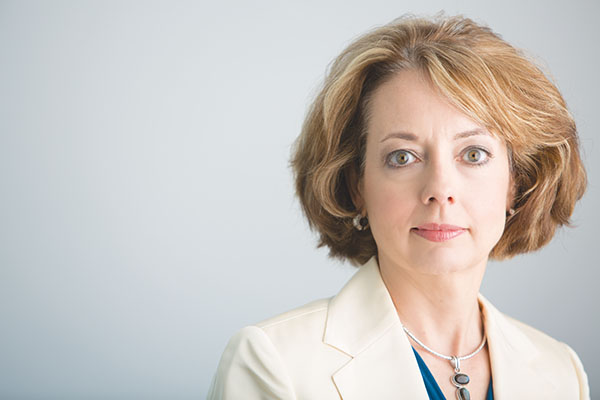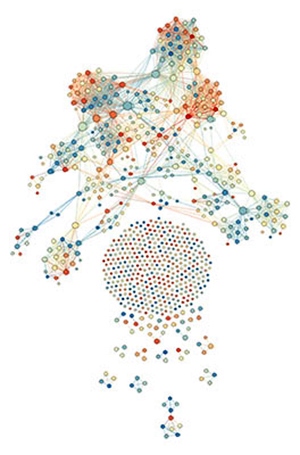Pacific Standard
September 09, 2013
Meet the Flexians
By Lisa Margonelli
A new professional class of movers and shakers-people who serve overlapping roles in government, business, and media with smiling finesse-is controlling the flow of power and money in America. The anthropologist Janine Wedel is bent on making us understand just how dangerous this new normal can be.
One Sunday last May, anthropologist Janine Wedel was standing in the security line at Washington's Reagan National Airport, about to embark on a few days of field research among members of an enigmatic modern tribe. She was, to be precise, on her way to a hedge fund industry conference in Miami Beach. A petite woman in her early 50s with large, hazel eyes, Wedel wore a pink dress, heels, elaborately coiffed hair, and conservatively thick makeup. She was a picture of non-threatening propriety, costumed to move among the financial elite just as an old-time anthropologist might have worn a sarong to study inhabitants in the South Pacific.
WA professor at George Mason University, Wedel has spent nearly two decades combining the tools of anthropology-old-fashioned ethnographic field research and social-network analysis-with computational social science to study one of Americans' favorite fears: corruption. A 2012 Gallup poll found that 87 percent of Americans thought it was extremely or very important to fight corruption in the federal government, second on their list of priorities behind "creating good jobs."
But what exactly is corruption? In an inverse of the way the Inuits of Nunavik supposedly have 53 words for snow, Americans use the word corruption to collapse dozens of distinct types of badness, ranging from bribery to fraud, extortion, vote fixing, drug trafficking, embezzlement, favoritism, prostitution scandals, money laundering, poorly monitored campaign contributions, and tax evasion. Corruption is such a vague category that its best definition is circular: Corruption is the stuff that crooks do.
Judging from public opinion, you might think that America is crawling with corruption. Survey after survey finds a precipitous falloff of trust in big institutions: Congress, the banking industry, religious institutions, the media. And yet going by some of the narrower definitions of corruption, the United States doesn't have much of it. The World Bank basically equates corruption with bribes, and estimates that the world loses a trillion dollars to them every year. But the U.S. doesn't have a big problem with bribery. According to a 2013 report by Transparency International, only seven percent of Americans surveyed reported paying a bribe in the last year-well under the global average of 27 percent. So what is wrong with us?

Janine Wedel (PHOTO: CADE MARTIN)
Across the political spectrum, there is a sense that something has taken control of the institutions that we used to trust. According to Wedel, that something is a new class of power brokers with a new set of cultural norms. Wedel calls these power brokers "flexians."
A flexian, as Wedel defines the term, is a creature peculiar to our moment in history: a mover and shaker who serves multiple, overlapping roles with smiling finesse-business consultant, think tank fellow, government adviser. He is someone who "glides in and around the organizations that enlist his services," she writes in her book Shadow Elite: How the World's New Power Brokers Undermine Democracy, Government, and the Free Market. "It is not just his time that is divided. His loyalties, too, are often flexible. Even the short-term consultant doing one project at a time cannot afford to owe too much allegiance to the company or government agency. Such individuals are in these organizations (some of the time anyway), but they are seldom of them."
Flexians aren't people furtively violating the law by stuffing cash into a freezer or promoting their cousins. They are a professional class obeying a new, elite social code that practically requires bending old rules.
For an example, look no further than that TSA line. See the full body scanners? Thank a flexian. While Michael Chertoff was serving as the head of Homeland Security in 2005, the department purchased five Rapiscan body scanners. When he left government he formed the Chertoff Group, and Rapiscan became a client. After a Nigerian man with explosives in his underwear attempted an airplane bombing on Christmas Day 2009, Chertoff appeared on CNN and elsewhere, advocating strongly for more scanners. TSA put in an order for 300.
In Wedel's analysis, Chertoff is a classic flexian, using his former role as a government official to enable his work as corporate champion, without always being upfront about his interests during his TV appearances. Were scanners what we needed to make flying safe? Was Rapiscan the best choice? Was it the best price? Who knows? All we know is that Chertoff was there, ready to position himself as a kind of fixer, spinning the interlocking gears of public fear, private interests, and Congressional appropriations.
Flexians are everywhere, once you start looking. As it happened, Rapiscan's lock on U.S. scanner contracts was broken by L-3 Communications, maker of a competing body scanner, whose lobbyists included former FAA official Linda Daschle. By late 2010, the government had spent $39.7 million on L-3's units. Daschle, of course, is married to Tom Daschle, a former senator who helped convince President Obama to set aside stimulus dollars for digitizing medical records-then advised private clients who were poised to profit from that money. He wasn't registered as a lobbyist, but he did have a perch as an expert with the Center for American Progress.
Wedel, knowing the story behind the scanners and feeling they weren't adequately vetted for safety, had no intention of walking through one. The TSA agents told Wedel she'd have to wait for a pat down. As the minutes ticked by, she started worrying about missing her flight. She didn't think the old methods of insisting on her rights would work. So the demure-looking, pink-clad anthropologist, dressed to blend in among the financial elite, did something bizarre, conspicuous, and calculating: She began singing The Star-Spangled Banner at the top of her lungs. She figured the last thing the TSA wanted to read was the headline "Woman Arrested for Singing National Anthem." In less than a minute, the agents sheepishly patted her down. And just like that, she blended back into her surroundings and went on her way.
WEDEL GREW UP AMID the wheat fields of Kansas, on the campus of Bethel College, a Mennonite institution where her father was a math professor. Bethel was a place where young Mennonites playfully, ritualistically pushed against the strict expectations of their culture in the form of pranks. Students put cows in the library; they stole chairs from the dining hall and hid them so well that the whole school ate sitting on the floor for days. The best pranksters, Wedel recalls, knew the rules well enough to bend them gently, playing with the group's trust in a way that didn't alienate friends but brought them together. "In order to do pranks you have to be able to scheme and devise a way around the system," says Wedel. "They pried the lid off of everyday life, and they showed that rules are socially constructed and can be violated." Pranks could be many things-a criticism of the rules, a hat tip to the order they create, and a wink at the audience all at once.
Years later, as a very young graduate student doing anthropological research in Europe, Wedel discovered an unlikely echo of those campus pranks in life behind the Iron Curtain. It was the early 1980s and Poland was under martial law when Wedel began to study the small tricks its citizens used to navigate and subvert the communist bureaucracy and economy. One of her favorite subjects was a formidable landlady she called "Mama," a survivor of a Siberian gulag who was an expert at cajoling scarce food from vendors and laying on charm when the state police visited in the middle of the night-a set of skills she called zalatwic, or finagling. Mama's maneuvers worked because she (and the many others using such practices) carefully managed how she appeared in different contexts, and she was expert at plumbing her environment for inside information on when, say, the next shipment of mineral water was due. It was these tricks-practiced by everyone at all levels-that finally challenged the communist party's hold on power.
In the late 1980s Wedel returned to Europe-and found that the original network of pranksters and schemers had become postwar Poland's rising power elite. When she visited officials in the new government, they would hand her multiple business cards-one for their government position, another for their consultancy, and another for a "foundation" or "NGO" they had started. "Sometimes these entities even did business with the government offices these officials supervised," Wedel writes in Shadow Elite. In the power vacuum left by the collapse of the one-party system, these players subverted the crippled authority of the state for their own ends. They seemed exotic, taking advantage of loopholes and opportunities that were unique to the time and place.
But in fact, it wasn't just in Poland that this was happening-nor was it only Central Europeans who were learning to fill the power vacuum. It was also foreign economic aid advisers. In 1994, Wedel followed them to newly post-communist Russia, where she started to study what had happened to hundreds of millions of dollars in U.S. aid given to the nation for market reforms. In a largely unprecedented move, Lawrence Summers, who became an undersecretary for the Treasury in 1993, had outsourced a key element of U.S. economic foreign policy to a private institution, putting the management of economic reform in Russia in the hands of the Harvard Institute for International Development. Guided by economist Andrei Shleifer and Jonathan Hay (who had recently graduated from Harvard's law school), the institute and its network of academics worked closely with a set of Russian counterparts known as the Chubais clan, after the high-level Russian power broker Anatoly B. Chubais.

This map shows the business associations of retired generals and admirals. The red dots are people who retired in the '90s; the larger blue and green dots are more recent retirees-and their many affiliations. Data is partially from a Boston Globe investigation.
In reality, these characters were just playing a much more sophisticated version of the multiple-business-card game. The reformers were, at once, academic experts, directors of millions of dollars in U.S. aid, government-sponsored privatizers of former Soviet industry-and investors in the newly privatized companies. In a foretaste of her flexian research, Wedel traced their overlapping roles for a book called Collision and Collusion: The Strange Case of Western Aid to Eastern Europe, which won a Grawemeyer Award for ideas improving world order.
Keep reading in PDF format.


